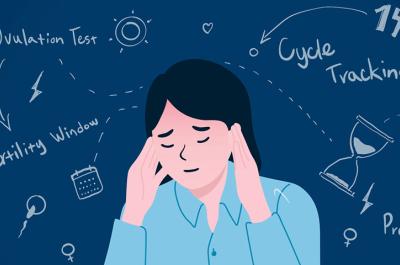6 Tips to Help You Emotionally Prepare for Trying to Get Pregnant

You’re ready. Whether you’ve spent years getting to this point or you and your partner decided on a whim last night, you want to have a baby. And that’s how we always say it, right? I want to have a baby. But this glosses over the next step, which isn’t always easy for everyone: trying to get pregnant.
For some, getting pregnant happens quickly. For others, it can take a lot longer than you might think. So while it’s important to be mindful of your physical health when trying to conceive, it’s equally important to give a little love to your mental and emotional health, too.
How long will it take to get pregnant? According to the American College of Obstetricians and Gynecologists (ACOG), for healthy couples in their 20s and early 30s, one in four women will get pregnant in any given menstrual cycle. By age 40, that number drops to one in 10. ACOG also states that ob-gyn doctors recommend trying to conceive for one year before investigating potential infertility problems. If you’re older than 35, that evaluation is brought forward to six months. And if you’re older than 40, it’s recommended you speak to your ob-gyn now.
At first glance, this may seem discouraging. If so, consider a new angle, and think about trying to conceive as a yearlong journey with good potential for earlier results. Each month is a new chapter, and sometimes the longest books come with the sweetest endings.
In this article
How emotions can affect fertility
Like any life change, trying to get pregnant can bring on a range of emotions. An optimistic outlook can have a positive effect on your journey to pregnancy, with studies showing the importance of managing stress. Here are six ways to focus on self-care.
1. Learn about your cycle
Your menstrual cycle is more than your period. Understanding what happens throughout the month is key, and these diagrams can help. Pay close attention to information about ovulation, which is when you release an egg (typically 12-16 days before your next period starts), to fully understand why timing is so important to conception. Knowing your fertility window will improve your chances of getting pregnant more quickly.
2. Talk to your ob-gyn
Be upfront about any personal physical or mental health risks you’re concerned about. Your doctor can provide you with resources and a game plan. Knowing what to expect and having tools readily available will help you envision a path with fewer roadblocks ahead.
3. Read or take a class
Entire sections of libraries and bookstores are dedicated to pregnancy. Some books are technical, some are funny, some are purely practical, some are religious, some have checklists, some have personal essays. You know you — find a book (or three) you’ll actually read.
4. Practice self-care
This can be as simple as eating nutritious foods (and some treats!). Drink plenty of water. Sleep enough. Move your body as best you can every day. Seek out silence in meditation, a nap or a warm bath. Take breaks from the noise of the internet and opinion-heavy forums. Allow yourself to feel your emotions — sadness, anxiety, joy, confusion, anger, resentment — without judgment. Give space to your feelings, sit with them and then move on. Create and maintain boundaries. Communicate with your partner, and share your needs and expectations with each other. Be kind to yourself.
5. Make it fun
It’s easy for sex to seem like a chore when you’re trying to conceive. To up the romance factor when sex is scheduled, you may need to spice things up a bit. Go on an old-fashioned date beforehand, buy some lingerie, change the setting, light candles, play some music or try something new. Putting your partner in charge of this is a good and easy way for them to actively help you on this sometimes bumpy journey.
6. Create a bubble of support
Scene: You’re pushing your shopping cart in the grocery store, and a beautiful woman with a killer outfit and gorgeous hair — who is obviously pregnant — is blocking the aisle, searching for a spice. You, on the other hand, have been trying to get pregnant for several months. You feel a sudden surge of anger — and then your cheeks flush as you wonder why on earth you felt such resentment toward a complete stranger.
You are not alone.
This scene has played out in grocery stores, restaurants and baby showers (especially baby showers) countless times. But even though you’re not alone in your feelings, trying to get pregnant can often feel isolating. So how do you create a bubble of support without announcing your sex schedule to the world? Find a way to share your feelings selectively.
While many women find emotional support in their partner, sometimes your partner can have a difficult time relating to the emotional and mental aspects of trying to conceive from a woman’s point of view. If that’s the case, and if you feel comfortable, consider reaching out to someone else, whether that’s a close friend you trust or an anonymous forum on social media, to share your thoughts. If you’re not ready to share your journey, consider journaling. Sometimes the simple act of writing out your feelings and frustrations is just as helpful as saying them out loud to a friend.
As you embark on this emotion-packed journey, the path may not always be smooth. But there is so much potential for joy ahead, and the creation of a love unlike anything you have ever known. You’re ready.

Looking for insights on your health journey? Clearblue® sends you curated, science-backed articles right to your inbox.
Sources:
- Evaluating Infertility. (n.d.). The American College of Obstetricians and Gynecologists. Retrieved Feb. 22, 2021, from https://www.acog.org/womens-health/faqs/evaluating-infertility.
- Having a Baby After Age 35: How Aging Affects Fertility and Pregnancy. (n.d.). The American College of Obstetricians and Gynecologists. Retrieved Feb. 16, 2021, from https://www.acog.org/womens-health/faqs/having-a-baby-after-age-35-how-aging-affects-fertility-and-pregnancy.
- Lynch, C. D., Sundaram, R., Buck Louis, G. M., Lum, K. J., & Pyper, C. (2012). Are increased levels of self-reported psychosocial stress, anxiety, and depression associated with fecundity? Fertility and Sterility, 98(2), 453-458. https://doi.org/10.1016/j.fertnstert.2012.05.018
- Lynch, C. D., Sundaram, R., Maisog, J. M., Sweeney, A. M., & Buck Louis, G. M. (2014). Preconception stress increases the risk of infertility: results from a couple-based prospective cohort study—the LIFE study. Human Reproduction, 29(5), 1067-1075. https://doi.org/10.1093/humrep/deu032
- Rooney, K. L., & Domar, A. D. (2018). The relationship between stress and infertility. Dialogues in Clinical Neuroscience, 20(1), 41-47. https://doi.org/10.31887/dcns.2018.20.1/klrooney
- University of Louisville. (2016, September). Stress negatively affects chances of conception, science shows. ScienceDaily. https://www.sciencedaily.com/releases/2016/09/160912161019.htm

How to get pregnant faster
There are a few key things you need to know if you want to maximise your chances of getting pregnant.




